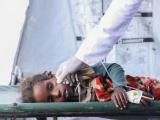Jan 20, 2011
More yellow fever reported in Uganda as vaccination launch nears
A yellow fever vaccination campaign targeting 905,000 people will start Jan 22 in northern Uganda, where 226 probable cases with 53 deaths have been reported in 12 districts, the World Health Organization (WHO) said in a statement yesterday. The agency said just five cases have been confirmed by the US Centers for Disease Control and Prevention, but 226 cases compatible with the clinical case definition, including 53 deaths, have been reported. The outbreak, which began in October, is the country's first since 1972. A report last week had put the number of cases at 190, with 48 deaths. On Jan 4 Uganda requested 1 million doses of vaccine from the International Coordinating Group on Yellow Fever Vaccine Provision, and the doses from the emergency stockpile were shipped on Jan 11. The WHO statement did not predict how long the vaccination campaign will take.
Jan 19 WHO statement
Survey: Americans question safety of foods from China
As the US government prepares to increase oversight of imported foods, a survey says Americans are most concerned about the safety of foods form China, according to a Reuters report. In the online survey of 571 people, respondents were asked to name the two countries or regions they perceived as having the least food safety oversight. Eighty-one percent picked China as one of the two, and 51% picked Mexico. Further, 48% chose Africa, 27% picked South America, and 11% chose the United States, the story said. The survey was conducted for Reuters by SupermarketGuru.com. In other findings, when people were asked to name two regions whose food products they avoid buying for safety reasons, three-quarters picked China, 42% picked Africa, 41% chose Mexico, and 24% said South America. Forty-nine percent of respondents said they believe organic and kosher foods are safer than most. The foods regarded as most dangerous were poultry (including chicken) and lettuce. The food safety law passed in December calls for the Food and Drug Administration and importers to increase scrutiny of imported foods.
Jan 19 Reuters story
Surgeon general report touts breast-feeding's disease-fighting role
Citing low levels of breast-feeding at 6 months and the health benefits of the practice, US Surgeon General Regina Benjamin released a report today that outlines steps for removing obstacles to breast-feeding. The 88-page report, Call to Action to Support Breastfeeding, said that breast-feeding protects babies from infections and adverse conditions, including diarrhea, ear infections, pneumonia, asthma, and obesity. Breast-feeding can also lower cancer risk in mothers. Benjamin said that women who want to breast-feed may face many barriers, such as a lack of support, lack of role models, insufficient information, and a lack of time and privacy at work. "Whether you're a clinician, a family member, a friend, or an employer, you can play an important part in helping mothers who want to breastfeed," she said in a news release today from the Department of Health and Human Services (HHS). The release said that while 75% of mothers start out breast-feeding, the level drops to 13% by the time the baby is 6 months old. Rates are particularly low among African-American women. Examples in the report for overcoming barriers include having communities expand mother-to-mother support programs, improving training for healthcare personnel on how to care for breast-feeding moms, and encouraging employers to establish paid maternity leave and high-quality lactation-support programs in the workplace.
Jan 20 HHS press release



















